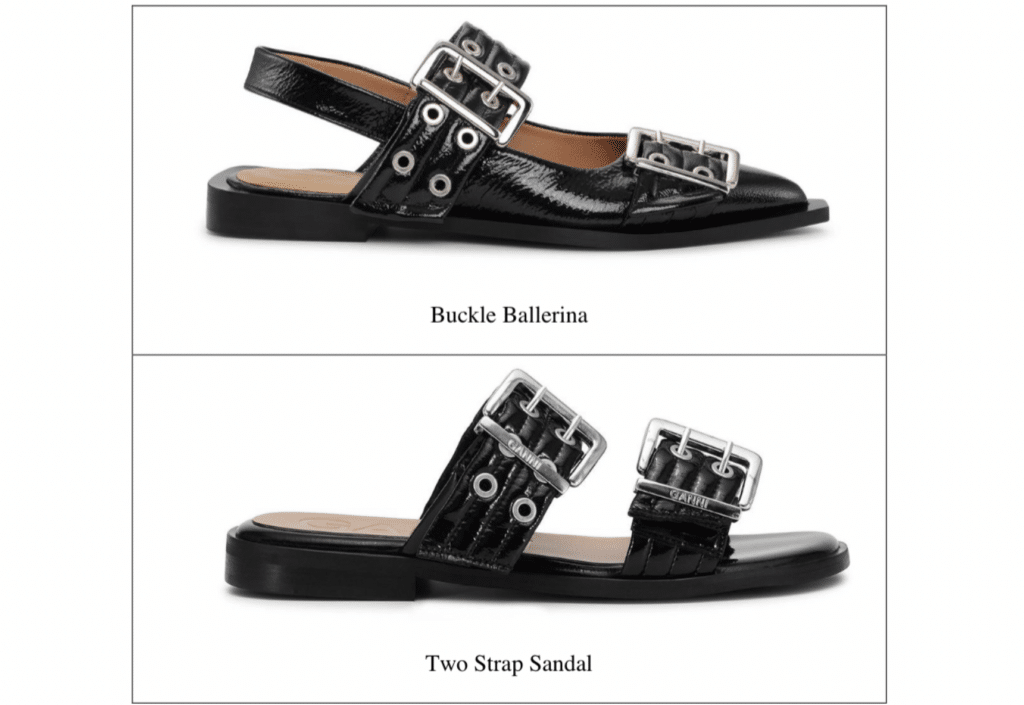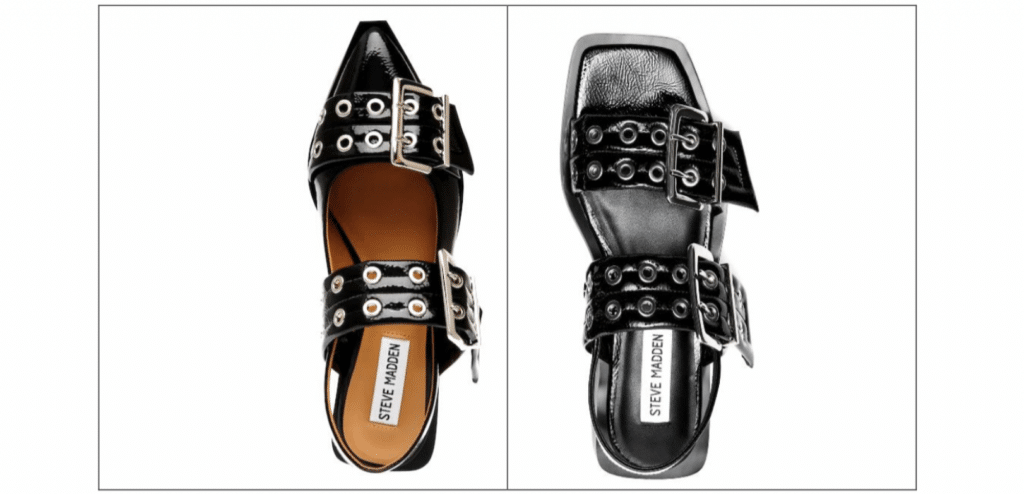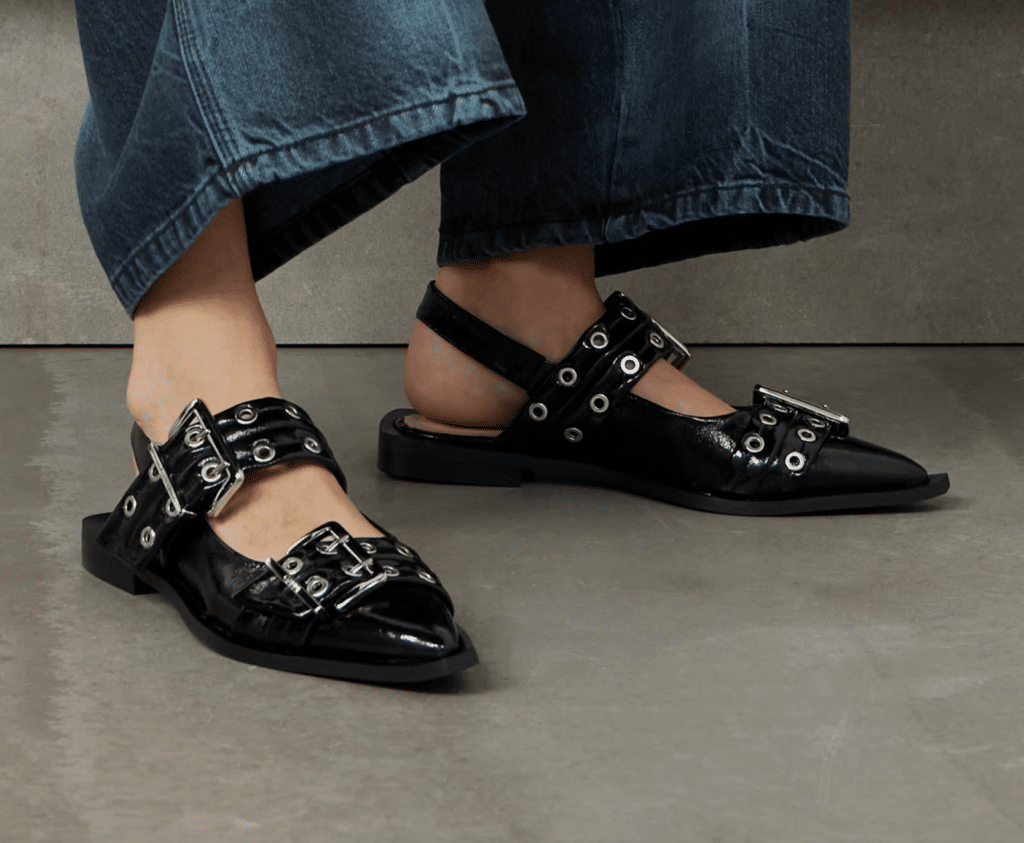A lawsuit that pits Steve Madden against Ganni A/S is heating up in federal court in New York. On the heels of Steve Madden accusing Ganni of running afoul of the law by sending unmerited cease-and-desist letters to retailers of its GRAYA and SANDRIA shoes on the basis that they infringe Ganni’s “copyrights and other intellectual property rights,” Ganni is pushing back by way of a slew of affirmative defenses. In response to Steve Madden’s tortious interference and libel claims, Ganni argues that the footwear brand has not alleged any “provably false assertions of fact,” “cannot establish that [Ganni] acted negligently, maliciously, or improperly,” and has not been injured by any of the activities carried out by Ganni.
Setting the stage in its recently-filed answer, Ganni rejects the bulk of the allegations waged against it by Steve Madden, including the New York-based shoe and accessories company’s tortious interference with business relations and libel causes of action, as well as Madden’s bid for declarations from the court that its GRAYA Flat and SANDRIA shoes do not infringe any copyright, trade dress, or patent rights of Ganni’s, and that it is not engaging in unfair competition by selling the aforementioned footwear.

> For a bit of background: Steve Madden alleged in its complaint in July that despite lacking rights in its $425 Buckle Ballerina flats and Two-Strap sandals, Ganni has been “harassing and threatening” it on the basis of its sale of allegedly infringing footwear of its own. In particular, Madden claims that Ganni has sought to block its sale of its $99 GRAYA and SANDRIA styles by way of “a rapid series of cease-and-desist letters.” And not only targeting Steve Madden, the footwear company claims that Ganni is “attempting to strong-arm Steve Madden [wholesale] customers,” such as Dillard’s and Nordstrom, “to destroy rightful Steve Madden designs and harm [its] relationships with its customers.”
The most compelling part of the filing is, of course, the affirmative defenses that Ganni asserts in response to the Steve Madden-initiated lawsuit, with the Danish fashion brand arguing, among other things, that its actions do not amount to tortious interference and instead, are legally-above-board strategies for competing in the market. Specifically, Ganni maintains that Madden’s claims are barred, in whole or in part, as a result of the doctrine of justification, a defense that exempts a party from liability because its actions were justified, or not wrong.

Ganni also points to the doctrine of privilege, which, in this scenario, likely refers to competition privilege – or protection for a business that engages in legitimate competition with competitors. In much the same vein, Ganni also argues that Madden’s claims are barred because it is “a competitor to [Steve Madden] and acted in good faith with legitimate economic self-interest.”
With regard to Madden’s libel claim, in particular, Ganni argues that it should be shielded from liability on the basis that any statements attributed to it “are not capable of defamatory meaning,” “are true or substantially true,” and “are protected opinion under common law and the Constitutions of the United States and the State of New York.” Beyond that, Ganni maintains that Madden “cannot establish that [it] acted negligently, maliciously, or improperly,” and thus, will fall short in making its libel claim. And still yet, Ganni claims that Madden’s claims are barred, in whole or in part, because “any statements attributed to [it] are not per se defamatory.”
Finally, Ganni challenges the causal connection between its alleged actions and any harm suffered by Steve Madden. (In its complaint, Madden argues that it has been damaged by Ganni’s activities. For instance, it claims that as a result of the letter that Ganni sent to Nordstrom, in which it claimed that Madden’s GRAYA flat “violates Ganni’s ‘worldwide copyright protections’ and unregistered designs in the Buckle Ballerina,” the “longtime Steve Madden customer … canceled hundreds of customer orders for GRAYA shoes based on Ganni’s misrepresentations.) Ganni asserts that damages that Madden alleges that it has suffered “were not proximately caused by any actions of [Ganni].”
With the foregoing in mind, Ganni requests that the court enter judgment in its favor, dismiss Steve Madden’s lawsuit with prejudice, and award it costs and reasonable attorneys’ fees.
THE BIGGER PICTURE: Ganni’s answer comes a few months after the buzzy brand landed a win in a separate lawsuit against Steve Madden in Denmark, with the Maritime and Commercial Court issuing an injunction barring Madden from offering, marketing, and selling one of its shoe styles in Denmark. In a decision in August, the Commercial Court found Steve Madden’s buckle-design shoe to be nearly identical to – and an infringement of – Ganni’s hot-selling Buckle Ballerina shoe.
Steve Madden unsuccessfully argued that its Grand Ave shoe is derived from general trends in the fashion industry and that it had not relied on Ganni’s product as a source of inspiration, and that the design elements that Ganni was trying to protect (namely, the buckles and the straps) are common in the industry and do not warrant copyright protection, echoing assertions it has made in the case at hand.
The case is Steve Madden, Ltd. v. Ganni A/S, 1:24-cv-04946 (E.D. NY).











